Peter MALONE
Genie
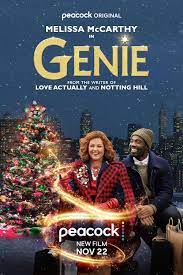
GENIE
UK/US, 2023, 93 minutes, Colour.
Melissa McCarthy, Paapa Esiedu, Denee Benton, Jordyn McIntosh, Alan Cumming, Mark Maron, Tate Ellington, Luis Guzman.
Directed by Sam Boyd.
Let’s imagine. We have three wishes for a Christmas film. Would you wish for a family theme? Of course. Would you wish for some magic and fantasy? Again, of course. But who would you wish for to play a genie? Maybe not, of course, Melissa McCarthy. But, then, why not? And here she is (perhaps something of a distant relative to Robin Williams in his Aladdin mode).
But, stop a moment! If you are in a sophisticated frame of mind, wary of sentiment, certainly not wanting anything very “very nice”, and if you demand down-to-earth realism, don’t come near Genie.
On the other hand, if you are in a happy mood, no objections to sentiment, niceness, improbabilities instead of realism, why not meet Melissa McCarthy as Flora McAllister, a genie in a box for 2000 years, suddenly released in New York City, the 2020s, adapting extraordinarily instantly, accent and contemporary vocab, some momentary flashbacks to her being condemned and boxed by an evil sorcerer, and her happy mentioning that she had met Jesus in his time, Cana, loaves and fishes, and now told that he was the son of God when she thought he was kidding!
There is a lot of this kind of dialogue, plenty of sentiment, plenty of goodwill, plenty of niceness – and, surprisingly written by Richard Curtis, a remake of his 1991 film, Bernard and the Genie, after a good number of of Blackadder comedies and well before Four Weddings, Knotting Hill and, is Christmas show, have a popular, Love, Actually. (Probably lots more Blackadder here then Love, Actually.)
So, a family story, very familiar, father caught up in work, put upon by his smarmy boss, played by Alan Cumming (who actually played Bernard in the original). Bernard is forced to miss his daughter’s eighth birthday, his wife dismayed, deciding to go to her mother’s, as always seems to happen. Bernard is played by British actor, Paapa Essiedu, looks and sounds very much like Chiwitel Ejiofor. He finds a box, rubs it and hey presto (or something equivalent, here is flora the genie.
If you enjoy Melissa McCarthy on screen, you will very much like her here, much the same, lots of wisecracks, extraordinarily American after 2000 years in the box, providing plenty of wishes for Bernard, allowing a lot of backtracking on wishes, going off with Bernard on a shopping spree, extravagantly wishing, a kind of consumerist Christmas – though Bernard explains to Flora that Christmas has become too commercialised and that is where he starts to explain to her about Jesus and Christmas and she does her reminiscing about him.
You don’t have to be Einstein or Shakespeare to know where this is all going. The point is just to enjoy the fantasy, hope that Bernard will be reconciled with his wife and daughter – and enjoy some comic situations along the way, the wish that the Mona Lisa be in the apartment in exchange for a football jersey souvenir (Bernard not realising that the real one will switch from the Louvre to his apartment with consequent police investigations!), And Flora going to the movies, swept up by the action of a mission impossible film and getting the most enormous crush on Tom Cruise!
Yes, it is very light, perhaps a bit silly, but, apart from the vociferously condemning serious-minded bloggers, a bit of enjoyment for the Christmas season – and all through the year!
- The title, expectations, Genie stories, precedent genies like Robin Williams?
- Writing by Richard Curtis, his original film, his long tradition in writing British comedy?
- The New York settings, the city, views, apartments, the streets, the markets, shops, movies? The musical score?
- Bernard, a nice man, his employment, his boss holding him up, the smarmy boss and his money, forcing Bernard to work, his being late, the present for his daughter, missing her eighth birthday, the reaction of his wife, the decision to move to her mother’s? The familiar situation?
- Bernard, the box, rubbing it, Flora McAllister appearing, in the box for 2000 years, Melissa McCarthy and her comic style, repartee, very American, jokes about her appearance, changes of clothes, discovering pizza, the shopping, big car, going to the movies, the crush on Tom Cruise? Her explanation of the wishes, unlimited, not just three, able to reverse? Her appearing and disappearing?
- The family story, Bernard and his discovering his limitations, love for his wife, outings with his daughter, the gift of the huge dolls house, the meals together? The comic sequence of his own family all turning up and being given three wishes, even the wish that one of them go to Hell, and reversed, still charred?
- Lenny, at the desk, his theory of parallel worlds, friendly with Bernard, his family, chatting up Flora, and the comic ending with him leaving, doing his own work, and Flora in the kitchen!
- The buildup to the climax, Bernard dismayed that his wife still wanted time, reappraising his wishes?
- The wish for Flora to be free? And his wish that he could start again, the jokey wish that his boss donate millions from his personal account for British and his dismay? The boss trying to hold him up, Bernard telling him off, resigning, going home, the delight of his wife and daughter?
- The 2020s Christmas fantasy?
One Life
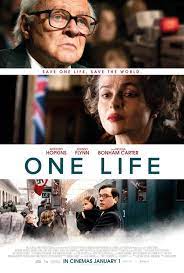
ONE LIFE
UK, 2023, 110 minutes, Colour.
Anthony Hopkins, Johnny Flynn, Helena Bonham Carter, Jonathan Pryce, Lena Olin, Romola Garai, Adrian Rawlins, Marthe Keller, Alex Sharp, Ziggy Heath, Samantha Spiro.
Directed by James Hawes.
There is great symbolism in the name of this film, British Nicholas Winton, one life and what he achieved. There is also the symbolism of anyone saving one life and that being an achievement.
In 2000 there was a popular documentary, narrated by Judi Dench, Oscar-winner for Best Documentary, Into The Arms of Strangers: Stories of the Kindertransport,, documenting a significant rescue of Jewish children from Czechoslovakia in 1938-1939. The children had been stranded, ousted by the Nazis after the occupation of the Sudetenland, many of their parents destined for the camps. A group of British helpers and locals, with the connections of Nicholas Winton, a young banker from London, getting the approval of the rabbi and the authorities, organising British passports for the children, adopting families and a financial deposit, were able to save 669 children on train journeys from prior to London. With the invasion of Poland September 1939, many children ready to move, but the program halted.
There were several other documentaries on Nicholas Winton and the children, especially the trilogy of films All My Loved Ones (1999), Nicholas Winton - The Power of Good (2002), Nicky's Family (2011) by Czechoslovakian (born in Bratislava, Slovakia), Matej Minak.
Here is a drama, rather than a documentary, based on the characters and events. And, as might be expected, the film is a very moving experience.
The framework of the screenplay is the 1980s, the older Nicholas Winton, retired, at home with his wife, expecting a grandchild, clearing the house and destroying some old documents, but finding a significant scrapbook of 1938-1939, photos of the children, newspaper articles, and Winton wanting it to find a significant home. In this he was aided by several authorities but especially by Robert Maxwell’s wife, articles, television programs.
And, of course, the strength of the film is in Anthony Hopkins’ screen presence and performance, Hopkins performing this role in his mid-80s. Veteran Swedish actress, Lena Olin, plays his wife.
Throughout the film there are strong flashbacks to what actually happened in Prague, versatile actor Johnny Flynn plays the younger Nicholas Winton, a concerned Britain, banker, friends in Prague, visiting, wanting to do something, the locals, including Romola Garai as Doreen and Alex Sharp as Trevor, are initially wary but all work together to identify the children, photograph them, list details, arrange with rather severe bureaucrats in London for passports, find adoptive parents, get financial deposits for the trip and the immediate settlement.
Nicholas Winton was helped by his German-born mother, very supportive and determined, especially in confronting authorities, a fine performance by a vigorous Helena Bonham Carter.
Audiences familiar with Nicholas Winton will have seen footage (available on YouTube) of the famous television program, reviewing Nicholas Winton’s life, where the compere asked anyone in the audience who had been helped by Winton to stand up. All those in the studio audience stood. A very moving moment at the time, and now in the film.
One Life is a reminder that there were so many in Europe who shielded and hid Jewish families, many who rescued them, and, as always, lest we forget.
- The story of Nicholas Winton and the rescue of the children from Czechoslovakia? Audience knowledge of Nicholas Winton, the documentaries about him and the transport children?
- A true story, the 1930s, the anticipation of World War II, anti-Semitism, Nazi expansion? The arrest of adult Jews, the children, stranded, their rescue by train? Adoption in England?
- The initial focus on the older Nicholas Winton, as played by Anthony Hopkins, the 1980s, his age, his marriage, children, home, retirement? The insertion of the flashbacks to 1938, Johnny Flynn as the younger Nicholas Winton, his mission and its achievement? The screenplay moving backwards and forwards in time, anchored in Anthony Hopkins’ strong screen presence, and Johnny Flynn’s persuasive performance, determination, hesitation, achievement in the past?
- 1938, Nicholas Winton, his strong-minded mother, German, coming to the UK with her husband, Jewish background? The changing of the name during World War I? A strong influence on her son? His role as a banker, conventionally British, of the time? Yet his concern, his friends in Czechoslovakia? His decision to go to Prague, the encounter with the group, the meeting with Doreen, her scepticism, Trevor, the local members, their concern, social action? The dangers? The imminent German invasion of the Sudetenland?
- Nicholas, his determination, his organisational skills, money and finance, raising donations, contacts in England? Working with the group, the visits of the rabbi, the Rabbi and his scepticism? Persuaded? Nicholas and his meeting the people, especially the children, their conditions, squalid, poverty, the parents, the wary father and then his change, fearing that Nicholas was a German authority? The range of photos, the young girls, their age, the little boys? Later sequences of Winton looking at the photos, wistful, remembering, regretful?
- The return to England, the character’s mother, her understanding, support, going to the officials, the issue of the passports, the hesitation of the bureaucrats? The personal appeal to the bureaucrat, his family, his agreement, supplying the passports?
- The organising of the children, getting all the details, the lists, the files, coordinating the train trips, the passports, organising the adopting families in England, and the financial deposit? The energy of the film in the sequences in showing the urgency, Nicholas and his mother, and those working in Prague, Doreen and Trevor, the locals?
- The scenes of the trains, the children, the farewells and grief, the hopes of the parents, arriving in England, the families, the allotments? Separation of families?
- The news of the invasion of Poland, the stopping of the program, the last train, the guards on the train and their treatment of the children, looking down on the adults accompanying them?
- The war, 669 children saved, the vast number unable to be transported?
- The 1980s, Nicholas and his wife, her fussing, wanting the house cleared, his throwing out rubbish, files, but the folder and the scrapbook, memories of Trevor? His going to visit the authorities, decisions for the scrapbook in museums? His wanting something more active? The connection with Robert Maxwell, going to see Lady Maxwell, her interest, the news items, reporting?
- The television program, Your Life, Nicholas vaguely watching it, his wife not liking the program? His being invited, the tracking down of some of the children and what happened to them in England? The program, his being in the front row, sitting next to one of the children, the reconciliation?
- The re-creation of the famous television program, Nicholas and his wife present, other two children next to him, the praise of his life, and the invitation to anyone in the audience who had a connection with the rescue children to stand up, everybody in the audience rising? The emotion?
- Prague, Doreen and Trevor, the information as to their surviving, subsequent work?
- The title of the film, saving long life, contributing to saving many lives?
Queen Marie
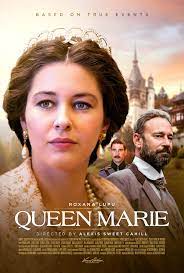
QUEEN MARIE
Romania, 2019, 115 minutes, Colour.
Roxana Lupu, Daniel Plier, Richard Elfyn, Patrick Drury, Ronald Chenery, Adrian Titieni, Anghel Damian, Karen Westwood, Nicholas Boulton.
Directed by Alexis Cahill.
For some distribution, the “of Romania” is attached to Queen Marie.
This is a Romanian story, World War I, the aftermath, 1919 and the Versailles conference and its decisions about the unification of Romania. This is a film very much for Romanian citizens to look at their past, for people in Europe. In many ways, it is a curiosity item for audiences outside Europe, events of 100 years earlier.
Marie is a strong character, a granddaughter of Queen Victoria, giving up her home and family to go to Romania, marrying the king, having five children, something of a brittle relationship, culminating in the war experience, a treaty with the Germans which was not ratified by the King but held against Romania by the Versailles conference.
There is enough about Marie’s personality, strength of character, relationship with the King, attracted to a Prince, clash and hostility with her oldest son, intervening in his life to dismiss his mistress if he was to be king, favouring her younger son but his turning against her at the end because of his education in England and wanting to stay there.
However, the focus of the film is very much on Romania itself and the Queen’s commitment, the difficulties of the Prime Minister being ignored at Versailles, her decision to go, mixed reactions from the cabinet, the King permitting, her son spurning her. She goes by train to Paris, applauded by the people in Romania, welcomed in Paris, press conferences and questions, an emphasis on what was criticised as a holiday, the comfortable hotels, the meals, a visit to England to meet King George and Queen Mary, her son.
However, the film shows her strength of character, forcing a meeting with the French Clemenceau who is eventually being charmed, the rude behaviour of Lloyd George and her challenging him, it is Wilson, Woodrow Wilson’s wife, organising a meal and the very strong opinions and domination of Woodrow Wilson, yet her challenging him.
Marie returns home, her son publicly spurning her, the king seeming not to support her, her withdrawing with her daughters to a country estate – and the king finally coming, declaring his love for her his way, a reconciliation, then revealing the news that she had been successful.
There is contemporary film footage at the opening of the film, the Austro-Hungarian Empire and the war, and footage at the end with the coronation of Ferdinand and Marie as king and queen of a unified Romania.
- Audience knowledge of World War I, the place of Romania, German occupation, treaties, Versailles conference? Decisions?
- Impact for a Romanian audience, European audience, outside Europe?
- The introduction, the contemporary footage, the outbreak of war, the Austro-Hungarian empire, the place of Romania? The contemporary footage at the end, the decisions for Romania, the coronation of Ferdinand and Marie?
- The settings, costumes and decor for the period? Locations, palaces and mansions, interiors? The Paris settings, the streets, the buildings, the hotels, lavish accommodation? The musical score?
- The portrait of Queen Marie, Queen Victoria’s granddaughter, the marriage to Ferdinand, politics, the influence of Queen Victoria’s descendants in Europe? The Kaiser and the war? George V and Queen Mary? The marriage to Ferdinand, brittle, the five children? Their care and nannies? Marie and her age, experience, manner of the Queen, with the servants, with her husband, the attachment to the visiting Prince, the hostility of Carlos, the daughters at home, marriages, Nick in England and his wanting to stay, spurning Romania?
- The war situation, the Versailles Conference, the emerging of the League of Nations, Lloyd George representing the UK, Woodrow Wilson and the US, Clemeneau and France? The picture of the meetings, the speech of the Romanian Prime Minister, people walking out, distracted and talking over him? His fears presentation of his point of view? The reactions in Romania? The Queen suggesting she should go, the king and his support, Carlos and his fears antipathy, the military antipathy, the various meetings, the decision that she should go? The crowds greeting her and the entourage, the train to France, the welcome in France?
- Marie and diplomacy, the danger of her spontaneity, her response to the international press, their questions, the tourism aspects, clothes, her wanting more serious questions? The hotel, the accommodation, the gift of the dresses and the reaction of the daughters? The discussion with the Prime Minister? Her various contacts in Paris, their trying to help?
- The meeting with Clemenceau, not available, her challenging him, his response, charm, the influence, coming to meet her on her departure?
- Lloyd George, the dinner, her speaking up strongly, his turning away from her, her continual challenge? The later meeting, her setting the place for the meeting, speaking strongly to him? Her visit to England, the meeting with Queen Mary, the discussions with King George, the influence?
- The tip about Edith Wilson, Maria going to meet her, Mrs Wilson’s support, the photos, going to the dinner, Wilson and his preoccupations, tough negotiations, hard decisions, Marie challenging him?
- The ultimate success of her interventions?
- Her personal relationship with the king, his staying at home, the phone calls, her urging him to intervene with Carlos and his mistress? Carlos and his hostility, his mocking her on her return? The encounter with Nick in England, his not wanting to return to Romania? Education for her daughter in England?
- The return, her being hurt, withdrawing, her daughters, her ruminating, her sadness? The king’s arrival, his declaration of love, then the news about her success?
- An interesting film for those not familiar with these aspects of World War I and the consequences?
Dinner in America
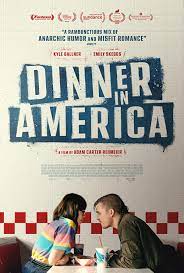
DINNER IN AMERICA
US, 2020, 106 minutes, Colour.
Kyle Gallner, Emily Skeggs, Leah Thompson, Nick Chinlund, Sean Rogers, Mary Lynn Rajskub, Pat Healy, Griffin Gluck.
Directed by Adam Reihmeier.
This is a small budget independent film, winner of quite a number of awards at small festivals.
The title is evocative, two key scenes in the film of the family dinners, arguments, bickering, smoothing things out, contrasting with praying grace but the telling of lies. And there are some dinners in diners.
The focus of the film is on Simon, unlikeable, obnoxious in behaviour flirting with a girl, going home to her house, dinner with her parents, misbehaviour with the wife, being ousted. He also makes contact with a young girl, Patty, who has limited mental abilities. Once again, he ingratiates himself, going to her family’s house for dinner, posing as a son of African missionaries, but also provocative, wanting to stay while he hides from drug dealers.
Most of the film shows the relationship between Patty and Simon, she at home, trying to be defiant, follower of a band and writing cards to the band leader (who turns out to be Simon who is shocked by the discovery), working in a pet shop being treated badly by the owner, not paid, mocked by the sports jocks and their girlfriends.
In fact, Simon and Patty Bond, Simon showing a bit more humanity, defending Patty against the jocks but being bashed (and, to his and Patty’s – and the audiences – bringing on their violent comeuppance).
There are further revelations about Simon, his affluent family, misfit, ousted, intruding on the house. Then there is relationship with the members of his band and money problems. And, the development of the relationship with Patty and defending her, and confronting the owner of the shop for her payment.
The film is well acted, the characters credible, even if not likeable.
- Expectations from the title? The number of dinners seen in the film? Family dinners and interactions? Dinners in diners?
- Independent film, small budget, the cast?
- Themes, misfits, family pressure, bullying, mental abilities, relationships?
- The focus on Simon, unlikeable for most of the film, seen eating, flirting, going home with the girl, dinner with the family, his manners and style, wanting somewhere to stay, the wife and the kissing, ousted? Wandering, hiding?
- Patty, her parents, district background, scenes at home, Kevin as adopted and the later revelation about this and effect on him? Her work at the shop, treatment by the owner, not paying her? Abusive behaviour? At the bus stop, on the bus, the two boys and their bullying her, the two boys kissing and their girlfriends in the bus, mocking her? Physical and mental bullying? Her going home, her room, music, the band, writing letters and cards to the leader of the band?
- Kevin, teenager, surly at the dinner table, discovering he was adopted, the drugs with Simon, their friendship, change of attitudes?
- Simon, the band, talking with the fellow musicians, their urging for a deal, the stoned member siding with Simon? Their music? Punk? Simon and his hairdo and people’s comments?
- Simon, the encounters with Patty, the attraction, going home, the meal, his telling lies, his parents as missionaries in Tanzania, blurting out Kevin’s adoption, Patty’s embarrassment having told him? The effect on the parents? His asking to stay, with Patty?
- The time together, the bonding, her story, his going to their home, getting her to sing her creative songs, the discovery that she was writing the cards, mixing the music, the family coming home, the hostility of the various members, Simon and his reactions, the husband and the children, aggressive behaviour, being ousted?
- The night with Patty, sexual, emotional, the effect?
- The boys and their mockery, going to their sports event, Simon taunting them, their bashing him? The revenge, getting Patty to lure them, bashing and stripping them, setting fire to their clothes, the reaction of the coach and the other players?
- The confrontation with the owner of the pet shop, the new employee, demanding the payment?
- Simon, his identity as Johnny, his role in the band, going to the venue, the clash with the producer, money issues? Onstage, performance, Pat’s response?
- Likeable and unlikeable characters, misfits, family and society pressures, behaviour, unsympathetic, sympathetic?
1972, Munich's Black September
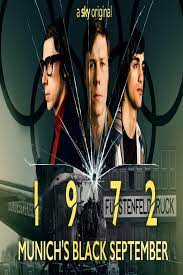
1972: MUNICH's BLACK SEPTEMBER
Germany, 2022, 92 minutes, Colour.
Directed by Christian Stiefenhofer.
The title almost tells it all. 1972 was the year of the Olympic Games set in Munich, a return to Germany after the experience of the Olympic Games in Berlin in 1936 and Hitler’s presence. But, Palestinian terrorist attack the Israeli athletes, abducting them, killing them, the response of the German authorities, the fate of the Palestinians, some killed, some arrested and deported.
This film was released on the 50th anniversary of these events.
There was a television film in the 1970s, not long after the events, 24 hours in Munich with William Holden. In 2005, Stephen Spielberg dramatise the events and the consequences in Munich, with a cast led by Eric Bana. There have been several documentaries over the 50 years.
The framework of this documentary is one of the German police, almost 50 years after the event, having participated in the action, deciding to visit the widow of one of the athletes. He is accompanied to Israel by his daughter for translation purposes. The film frequently goes back to the meetings, the conversations, the memories, including flashbacks, the regrets, and the strong-minded widow appreciative of the visit.
As expected, there are quite a number of interviews with survivors, some of the Israeli team who are not abducted, many members of the German police, politicians at the time, even an interview with one of the Palestinians, whose location is not identified and in this film from the back, introducing the Palestinian perspective on Israel.
The film also has great advantage of so much newsreel and television footage which brings the action once again to life.
And, the film uses the device of dramatic re-enactments, especially in the portrait of the Palestinians, their arrival in Munich, the accommodation the hotel, the discussions about the motivation – and later images of them, their Palestinian idealism, to make a protest because Palestine was excluded by the Olympic Committee, to make their presence felt. However, it led to a massacre.
One of the main criticisms of the film is of the German authorities, some re-enactments of the discussions, the planning, the young age of so many of the volunteers (around 21), their inexperience, on the plane, their wanting to retreat, the shooting, the death of a policeman.
There is also footage of gold in my year, Prime Minister in Israel at the time, quite relentless in her attitude towards the Palestinians and the uprising. By contrast there are scenes of Willy Brandt and his explanations of the situation.
It is valuable to look back on past crises, to acknowledge the realities of past, but to reinterpret them with hindsight, in this case the hindsight of 50 years.
Cat Person
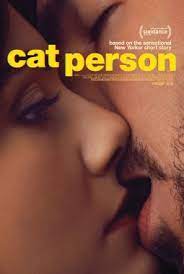
CAT PERSON
US, 2023, 118 minutes, Colour.
Emilia Jones, Nicholas Braun, Geraldine Viswanathan, Isabella Rossellini, Hope Davis.
Directed by Susanna Fogel.
It would seem that in 2017, a short story in the New Yorker, by Kristen Roupenian, was an immediate runaway success. It has now been turned into a film – although, commentators note that the final 30-40 minutes of the film are an addition to the original short story.
The unwary viewer, not familiar with the short story, probably expects a horror film in the vein of Cat People or memories of Batman’s foe, Catwoman. But, this is not the case. A cat person is someone who likes/has cats whether they will admit it or not!
But, this is a story for the younger generation, very much in the contemporary social media world, dating and, especially self-revelation, communication by text.
In reflecting on this film, this reviewer came across an IMD blog which more succinctly expressed the key elements and response to the film:
Exploration of why romance fails
feczo25 November 2023
Romance, both sides seek it, but often there are very different ideas about what that means.
The movie explores pitfalls of idealisation of the other person, placing looks above genuine connection and feelings as well as double standards and jumping to conclusions without trying to deeply understand another person.
It is also accurately portrayed how people read more into text messages than the sender intends both positively and other times negatively perceiving a neutral or opposite intent, or just making it wildly colourful.
Although the characters are somewhat stereotypical and extreme the situations are not far from everyday life, so they are relatable.
"Cat Person" is about the thorny complications of male-female "courtship" rituals, riddled with misunderstandings, unspoken misgivings, and ignored red flags.
Very well put, only to add that the performances are strong, Emilia Jones (British, star of the Oscar-winning CODA) as Margot, Geraldine Viswanathan (Australian) as Margot’s protective friend, Taylor, and Nicholas Braun (American) as the sometimes bewildered, often clumsy, movie fan, Robert.
- The title, expectations of horror and titles like Cat People, Catwoman…? Rather, a person who has cats, admits this or not?
- The background of the popular New Yorker short story? The final part of the film adding to the story?
- The American city, college, dormitories and rooms, cinemas, concession stand? Bars and meetings? Restaurants? The streets? Musical score?
- The range of songs throughout the film, classic songs, contemporary, and the effect of the lyrics on situations and characters?
- A film about dating, communication, getting to know partners or not, presuppositions and presumptions? Communication, personalised, in personalised with texting? Instant texting, affirmations, later regrets?
- Margo’s story, aged 20, some family background, the visit to the family, singing with her mother? Sophomore, sharing rooms, friendship with Taylor? Other members of the college? Boys and meetings? At the cinema, showing classic movies, the customers?
- The encounter with Robert, coming to the cinema, her comment on what he is buying, his taking it is an insult? His return, phone numbers? Time passing and not meeting, all the texting, the relationship set up by the texting? The effect on each of them?
- Taylor, best friend, her on-line concerns, feminism, definite in her opinions, protective of Margot? Speculation about people online, their identities, men with feminist views?
- The discussions with the former boyfriend, his explanations about experimentation being asexual?
- The relationship between Robert and Margot, the suggestion of the date, texting about The Empire Strikes Back, her reactions, his interpretation that she liked films with subtitles, tangled messages, her agreeing, going to her cinema, watching the film, her being flirtatious, leaning on him with the popcorn, his absorption in the film, Han Solo and layer and a kiss? Her dissatisfaction with the outing, the going for a drink, the interactions, understandings and misunderstandings?
- Margo, her imagination, the information that men are afraid that women will laugh at them, women that that man will kill them? Her nightmares, the dog and the corpse, Roberts various occupations, attacking her in the car…?
- The awkwardness, the episode of the kiss, her comments about how badly he kissed, revelation that he was 34, is isolated life? The going to his home, the long sex scene, her alter ego watching and commenting, the effect of the experience, on Margot at her dissatisfaction? On Robert?
- The aftermath, Margot wanting out, the discussions with Taylor, Taylor and her texting, the next episode of texting, Robert and his moods, desperation?
- The clash with Taylor, arguing, ousting, Taylor and her dependencies?
- Margo, moods, riding the bike, going to Robert’s house, the arguments, the misunderstandings, the violence, the attack, the mace in her eyes, the physical fight, to the basement, the fire, the escape, Robert leaving, urging Margot, her hesitation, later escaping?
- Taylor, searching for Margot, the cab driver, the burning house, the explanation of identities?
- The police, the basement, finding the bodies, hospital, recovery?
- Robert, nurse, leaving the hospital, disappearing? Margo, the experience was Robert – and her future?
Santa Camp

SANTA CAMP
US, 2022, 92 minutes, Colour.
Directed by Nick Sweeney.
Yes, this is a documentary about an annual camp in New Hampshire, organised by veteran Santa, Dan Greenleaf, for a group of men who act as professional Santas at Christmas time and together together, an enjoyable time, but also an opportunity for sharing about how to be effective in their role as Santa Claus. Some discussions, tutorials, role-plays, questions about how children behave meeting Santa.
We are introduced to many of the men, retirees from their work, a bit more portly than they used to be, and many of them with their own long flowing white beards. They explain themselves in an engaging way.
If this film, and HBO Max documentary, were just about the cheerful getting together, it would be enjoyable enough. However, there are more serious tones and themes within the film.
One of the enjoyable themes is that of the rise of Mrs Claus, some of the older women speaking to camera about the traditional role of Mrs Claus, her equality with her husband, working together with him – and there are a number of women coming to the summer camp as Mrs Claus.
But there are very serious themes as well.
The film makers go to Arkansas, to an affluent white suburb where there is an African-American family living. The father has decided that he wants to be a Santa role model for his child, even to having images of a black Santa. And, hearing about the camp in New Hampshire, decides to go. This raises the issue of the traditional image of Santa, especially from the US in the 19th century, but mention of images offered of St Nicholas, olive complexion and, from Turkey. However, there is a general expectation that Santa, especially in all the illustrations, cards, decorations, Coca-Cola advertisements, is white. The Santa from Arkansas gets a chance to raise the race issues, highlighting an extraordinary bigoted letter against him, signed Santa, then burning it after reading it to the group.
In fact, the Santa group is very understanding, quoting one of their fellows, Dick Marshall, who died in 2021 but is seen in clips, making a statement: God does not create junk. And this is repeated throughout the film, especially when other issues are raised, one of the Santas being a young man, cared for by his mother, medically, mentally and physically impaired. He is enthusiastic about participating in the camp.
And, then there is the issue of the trans-Santa, interviewed, explaining identity, transformation, role as a Santa. (The director of this film, Nick Sweeney, made several documentaries previously on transgender issues.)
There is quite a deal of discussion about the image of Santa, the response of children, tradition, but a changing world of cultures and what that means. However, the film shows many prejudiced people, especially Christians who assert bigoted presuppositions as to who can be Santa – with the reminder of Dick Marshall is saying, God does not make junk.
So, entertaining in itself and raising a great deal of contemporary issues.
Silent Night/ 2023
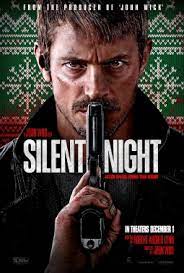
SILENT NIGHT
US, 2023, 104 minutes, Colour.
Joel Kinnaman, Catalina Sandino Moreno, Scott Mescudi, Harold Torres.
Directed by John Woo.
Movie buffs will have great memories of Hong Kong director, John Woo. He was prolific in the 1970s, came to greater attention with his crime thrillers, violent action and stylish filmmaking in the 1980s, making his mark in the US in the 1990s, especially with Face/Off, moving then to a range of films but many focusing on Chinese history.
Now he is back in the USA (though filming in Mexico with a Hispanic team), very much as we used to appreciate him but this time with a great difference. His title is Silent Night, and the Christmas Carol does play in the early part of the film as well as, ironically, and more forcibly in the violent climax. However, he puts the emphasis on Silent. This is very much a silent film. We hear only four words throughout the film (and, unfortunately/realistically, the perennial four letters) – but there are all the sound effects and some muted musical score. This is something of a tour de force, audiences gradually realising that they are not going to hear word spoken, but, as in the old silent days, communication by facial expression and, strongly, by body language.
John Woo turned seventy six while he was filming Silent Night. But he does not seem to have lost any of his verve, especially in staging chases, shootouts, martial arts training, violent fights and spectacular climaxes. All here.
The action focuses very much on Brian, played by Joel Kinnaman. We see him running at first, desperate, looking at a red balloon, hurrying down streets, encountering two cars and a shootout, finally cornered, a tattooed criminal confronting him, shooting him in the throat. But, he survives, unable to speak.
While this must have been a great challenge to Kinnaman and his acting skills, he is completely convincing, recuperating, tensions with his loving wife and her leaving him, the introduction of flashbacks to his playing with his young son and the tragic revelation of what happened.
But, this is a revenge drama, Brian going into vigilante action, audiences sympathetic to the calling to justice of the criminals but also wondering about the destructive effect on the psyche and moral behaviour of a man out for vengeance. On his calendar, he marks Christmas Eve 2022 as the day of vengeance, the anniversary of the death of his son. And, for months, we see him training, using video programs, martial arts, weapons, buying and fortifying a car.
Apart from the criminals, the other main character is a local detective, played by Scott Mescudi (in no way of relying on his musical identity, Kid Scudi).
As mentioned, John Woo has not lost his pace, and this is particularly so in the violent and ultimately fiery climax, high body count, choreographed fights, and Brian turning into something like a human Robocop (and then this reviewer suddenly remembering that in the remake of Robocop, Robocop was indeed played by Joel Kinnaman).
Obviously, a film for the fans rather than for audiences who shun the sight of blood (in close-up early in the film during the throat surgery)!
- Title, the Christmas him, played at the beginning, during the climax? Christmas Eve, Brian and his being unable to speak, silent vengeance?
- The career of John Woo, his heyday in Hong Kong in the 1970s and 1980s, the US in the 1990s, mixture of films, making this film at age 76? His themes, his style, pace, action?
- The introduction, Brian and his desperate running, the balloon, the pursuing cars, the lanes, crashes, the rival gangs and shooting? His being trapped, shot in the neck?
- The hospital sequences, reviving him, his wife’s presence and support, the visit of the detective? His being unable to speak? The scenes of rehabilitation, getting strength back, going home, morose, his son’s room, unable to speak, with his wife, her going to work, texting? Her giving up, packing, leaving? His later watching her and her painting?
- His memories, the insertions in flashbacks, playing with his son, his wife taking photos, the drive-by, the violence, the shooting, his son’s death, Brian in desperate pursuit?
- John Woo and his decision to have a silent film, communication by face and by body language, keeping the sound effects, more subdued music, Silent Night, some texting, only a few words heard? The equivalent of a silent film and its drama, communication, audience response?
- Brian going to the police, the office, the range of photos, criminals, most wanted, his taking photos of them all, leaving, putting them on the wall of his workshop? His decision for vengeance, the film as vigilante vengeance? The effect on the criminals? The effect on the vigilantes himself?
- Buying the car, driving, speed, turns and twists? His bodybuilding, studying the video, the dummy, weapons, building himself up over the months? The calendar, the aim for Christmas Eve, the anniversary of his son’s death? To kill everyone?
- Taking photos, surveillance, his killer and the girlfriend, luxury, the drugs? The drug deals, the money people? The range of thugs?
- His abduction of the money man, tying him up, freeing him, the fight, wounds, defeating him, finding him and leaving him at the detective’s door? Map and indications? The effect on the detective, his mission, following through?
- The climax, Brian becoming the human equivalent of Robocop? In the car, the shootings, in the middle of the gangs, his strengths, his limitations, worms? Infiltration into the building, setting the bomb and the fire, the shootouts?
- The detective arriving, following through, intervening, confronting Brian, shooting the girl? His being wounded?
- Brian, the threat of the girl, her malice, her death, going into the adorned room, seeing his adversary, the fight, wounded, killing the murderer, lying on the floor, with the detective?
- The final sequences, moving from the violence, to the happy memories of former days, the son, his potential for growing up? Regrets, achieving his mission, death?
Remember Me, the Mahalia Jackson Story
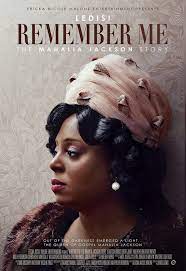
REMEMBER ME, THE MAHALIA JACKSON STORY
US, 2022, 82 minutes, Colour.
Ledisi, Keith David, Corbin Bleu, Janet Hubert, Vanessa Williams, Columbus Short, Andy Lauer, Keith D. Robinson.
Directed by Denise Dowse.
This is a brief biographical film, focusing on Gospel singer, Mahalia Jackson, her background, her talent, her career.
She is played by singer, Ledisi Young, who played Mahalia in the portrait of Martin Luther King, Selma.
Within the short running time, there is a background sketch of growing up in the south, the vivacious Mahalia, her mother with ambitions but thwarted, collapsing and dying, their father unable to look after the children and entrusting them to their very severe Aunt Duke. But, in New Orleans, Mahalia is delighted with the music and the local dancing.
10 years later, her mother’s sister takes her to Chicago, rather wide-eyed, singing Gospel, quickly meeting an entrepreneur, played by Keith David, who persuades her to sign a contract.
It is a very enjoyable club sequence in Chicago where the impressionable Mahalia goes to a club to meet friends and is delighted with Duke Ellington, Cab Calloway and Louis Armstrong.
One of the main advantages of the film is that the action pauses, so to speak, and there are many songs sung by Ledisi with her powerful voice. This comes to the fore, as it did in her life, with her meeting Martin Luther King (here played by Columbus Short), friendly with him, joining his Civil Rights causes, singing powerfully at the March on Washington (also seen in the film, Ruston, with DaVine Randolph as Mahalia Jackson).
There is some background on her personal life, mention of the first marriage, some more focus on her second marriage and her sense of betrayal.
The framework of the action is her visit to Hamburg where she is interviewed. While her company got rid of her because her albums weren’t selling, she had a successful career in performance, the film ending with her death.
- Audience knowledge of Mahalia Jackson? Singer, gospel, her career, international reputation? Singing at the March on Washington?
- The performance of Ledisi, embodying Mahalia Jackson (and playing her in Selma), personality, life story, the interview and reflections, the singing and performances?
- The early 20th century, the South, African Americans and their status, the home, Mahalia and her brother, her aunt, mother and father, the focus on the mother, watching the younger generation dancing with enthusiasm, her personal frustrations and loss of dreams, the speeches, collapse, death? The funeral? The children’s grief? The father unable to support them, giving them to their aunt Duke, her sternness? The parade in New Orleans, the dancing, the music, the young Mahalia joining in, the art watching?
- 10 years passing, the visit of the aunt, the dream of Chicago, Aunt Duke and her stern comments about white treatment of Blacks, Mahalia going, the arrival in Chicago, the aunt singing, the exuberance, Mahalia singing, the record company, the interview, immediately signing the contract?
- Her going to the club, the re-creation of the period, music, the compere, Duke Ellington and the band, Cab Calloway and his style of singing and audience response, Louis Armstrong? Her relishing this? But her religious background, identity, wanting to seeing only gospel?
- The outline of her career, success, records? Concerts? The record company dropping her, the need for her to promote albums?
- The sketchy outline of her personal life, the mention of a first marriage, her admirer, at the club, making contact, the proposal, the wedding, his roving eye, her suspicions, spurning him, ousting him? His later being in the concert audience?
- Civil rights issues, the encounters with Martin Luther King, friendship, her collaboration, singing, the March on Washington and her performance, later Martin Luther King phoning her, feeling alone, her singing and supporting him? The impact of his death on her?
- In Germany, the interview, the question is, the possibility for her to reminisce?
- Her status, achievement, Gospel songs, wide audiences, personal life, Civil Rights?
Saltburn
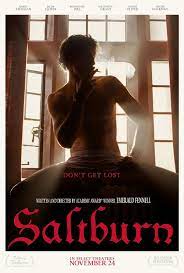
SALTBURN
UK, 2023, 127 minutes, Colour.
Barry Keoghan, Jacob Elordie, Archie Madekwe, Rosamund Pike, Richard E.Grant, Carey Mulligan, Alison Oliver, Paul Rhys.
Directed by Emerald Fennell.
While Saltburn is the name of a sumptuous English country estate, its sound echoes something like a chafing irritant. Not entirely irrelevant to the themes.
Writer-director, Emerald Fennell, won a writing Oscar for her initial feature, Promising Young Woman. This was quite disturbing experience – and Emerald Fennell’s audience is now offered even more disturbing experiences.
This is the story of Oliver Cook, played with sometimes deceptive intensity by Barry Keoghan (Irish, having made an impact with Killing of a Sacred Deer, Banshees of Innisfail). He narrates, quietly taking us into his confidence, pondering his emotions and motives. He is from Preston, average family, though he has some stories about his parents and failures, scholarship to Oxford, looked down on by elite students, but in a kindly gesture, befriending the aristocratic Felix Catton (Jacob Elordie who was a very tall Elvis in Priscilla). He is spurned by Felix’s financially dependent cousin, Kylie (Archie Madekwe Gran Turismo).
In fact, Saltburn has a a very strong cast, especially at home with Rosamund Pike at her superior best as the mother and a dithering Richard E.Grant as the father. Alison Oliver is the precocious daughter and Paul Rhys the most supercilious Butler ever on screen! And there is an arresting cameo, Pamela the unwanted but tolerated guest at Saltburn, from the promising Young woman herself, Carey Mulligan.
Felix invites Oliver to Saltburn for the summer – a benign gesture, but very precarious as Oliver makes his tentative way in relating to the family.
So many commentators have made the link between Oliver to Tom Ripley, remembering Anthony Minghella’s classic The Talented Mr Ripley. And, with the country estate, there are references to Brideshead revisited. And, it is probably fair to say that this is Evelyn Waugh 21st-century style, something of Brideshead Re-revisited, where society has made a descent into the vapid without any trace of the transcendent.
However, a useful comparison might be Pier Paolo Pasolini’s highly controversial 1968 drama, Teorema, an initially sweet Terence Stamp invited to live with the family, his manipulation of each of the characters for their destruction. (And, at this time, there were two British variations on this theme, Michael York in Something for Everyone and Peter McHenery in Joe Orton’s Entertaining Mr Sloane.)
A popular saying, sometimes cliche, is that all is fair in love and war. Oliver confides to us his feelings and his love, and his sometimes provocative sexual behaviour, but, as his stay for the summer goes on, it would seem that for him all is fair in the undermining war he has set out on.
So, certainly a provocative film, certainly an uncomfortable film to watch, sometimes funny, always serious, a satiric attack on traditional British aristocracy, more than a touch of the mordant.
Barry Keoghan certainly gives a strong and memorable performance, and, in retrospect, especially with the final unmasking and literal exposure, a very subtle performance. This will probably be talked about for a long time – and it will certainly be very interesting to see the next steps in his career.
- The title, the estate, the echoes of the sound with salt and burning, as relevant to all of this behaviour and the families experience?
- The title, the lettering, the gates, the mansion, sumptuous interiors, the exteriors, the grounds? The musical score?
- Echoes of Brideshead Revisited, Evelyn Waugh for the 2020s? But a complacent aristocracy, self-focused, in decline, nothing transcendent?
- Echoes of Patricia Highsmith, Tom Ripley, the opportunist, insinuating himself, relating to the characters, destroying them? Sociopathic? The films of the 60s like Teorema?
- The focus on Oliver Cook, Barry Keoghan’s performance, confiding to the audience, hopes, loves, emotional puzzles? His commentary on his behaviour? His age, his story of his parents, negative images, and the comic melodrama of Felix discovering the truth, the ordinary parents and their hopes? His scholarship, the importance of being at Oxford? The chatty friend, his belly tolerating this, abandoning him for Felix’s invitation? Revelation of his opportunism?
- The incident with the bike, helping Felix, Felix’s gratitude, invite him into the circle? (And the final revelation that he can had contrived the flat tyre and created the situation for insinuating himself?) The other friends, conversation, drinking, the situation with paying for the drinks (and the later revelation that he did have enough money but capitalised on Felix’s generosity)? However, Farleigh seeing right through him?
- The invitation to the summer, the journey, arriving early, Duncan as the butler, fastidious, snobbish, his observing Oliver throughout the visit? The impression of the home? Felix and the introduction to his parents, his sister, and finally being present, depending on the family for his finances, his back story about his mother, America?
- The summer holidays, relaxing, the swimming, discussions, socials, parties? Oliver and his birthday party on the lavish presentation?
- Oliver insinuating himself, the mother, social snob, but vapid ideas, the treatment of Pamela, her behaviour at the table, her back story, the hence to get rid of her, and the story of her suicide? The father, seemingly dithering, preoccupied with his interests? But their both accepting Oliver?
- Venetia, eating disorders, her age, her self-assertion, smoking, sexuality, the encounter with Oliver and its being observed, Farleigh and his angry reaction, Venetia and her continued flirting, the eating, a dependence on Oliver?
- The visit to his parents, Felix insisting, the revelation of the truth, their being very ordinary, his lies, the consequences for Oliver?
- The ambiguity of the birthday party, in the context of his lies, the birthday cake? Costumes, masks, being unmasked? And the satisfaction of the parents in hosting the party and its success?
- The image of the labyrinth, the meeting with Felix, the challenge – and Felix’s death, the blood, and eventually seen in the final flashbacks? The encounter with Venetia, the bath, the blood, her death?
- The funerals, whether Oliver should stay or not, the initial welcome, the father suggesting that he should go, Oliver refusing? Ousted?
- Sometime later, the seemingly chance encounter with the mother, the cakes, the discussion, her invitation? The story of her husband, his death?
- The mother, her illness, Oliver contriving it, removing the connections, her death?
- His success in ingratiating himself with everyone, the consequences, dependence, his inheritance?
- The dramatic impact of his stripping, after seeing him lying on the grave of Felix, the sexual overtones, and then his dancing, completely unmasked and exposed, throughout the house which was now his?